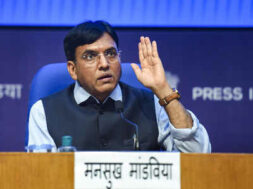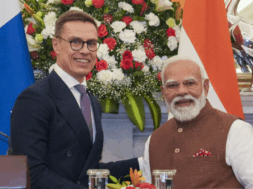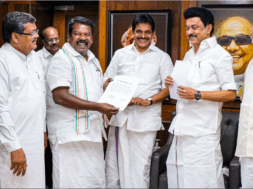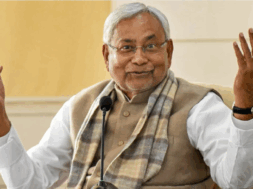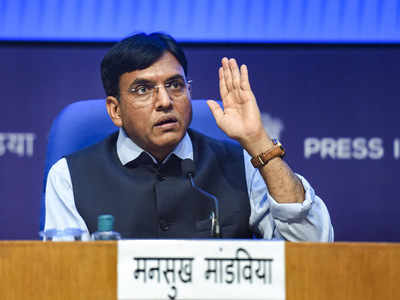
“Severity of Omicron is Anticipated to be Low:” Health Minister
Manas Dasgupta
NEW DELHI, Dec 3: Even as the centre assured the people in the country that the severity of Coronavirus infections due to the emergence of the new variant Omicron was expected to be “low,” the Indian genome scientists have recommended a booster dose of the Covid-19 vaccines for those above 40 years with preference to high-risk and high-exposure population.
The union health minister Mansukh Mandaviya answering questions of the members in Parliament on Friday admitted that the scale and magnitude of the rise in cases and most importantly the severity of disease that might be caused was still not clear,” the severity of the disease was “anticipated to be
Low” though the “scientific evidence was still evolving.”
The minister forwarded the reasons for the government’s calculations of a low severity was based on the high pace of vaccination that had been carried out in the county taking a large section of the vulnerable population from the risk of catching the infection, and the exposure of a large section of the population to the Delta variant as evidenced by high seropositivity.
The minister said vaccine protection was by antibodies as well as cellular immunity, which was expected to be relatively better preserved. “Hence, vaccines are expected to still offer protection against severe disease and vaccination with the available vaccines is crucial. If eligible, but not vaccinated, one should get vaccinated,” he said, while calling for extra vigilance in enforcing public health measures to contain the spread of the Omicron variant.
The government agreed that the Omicron cases were increasingly being reported from countries outside of South Africa and given its characteristics, it was likely to spread to more countries including India. “However, the scale and magnitude of the rise in cases and most importantly the severity of disease that will be caused is still not clear,” but “given the fast pace of vaccination in India and high exposure to Delta variant as evidenced by high seropositivity – the severity of the disease is anticipated to be low. However, scientific evidence is still evolving,” Mandaviya said.
On the question if the existing vaccines would also work against Omicron, the minister said, “some of the mutations reported on Spike gene may decrease the efficacy of existing vaccines. However, vaccine protection is also by antibodies as well as by cellular immunity, which is expected to be relatively better preserved. Hence vaccines are expected to still offer protection against severe disease, and vaccination with the available vaccines is crucial. If eligible, but not vaccinated, one should get vaccinated,” it has said.
Reassuring the people that variants were a normal part of evolution and as long as the virus was able to infect, replicate and transmit, it would continue to evolve, the government said “not all variants were dangerous and most often than not, people would not notice them. Only when they are more infectious, or can reinfect people etc they gain prominence. The most important step to avoid generation of variants is to reduce the number of infections, it said.
“The Indian Government is monitoring the situation closely and is issuing suitable guidelines from time to time. The scientific and medical community is geared for developing and deploying diagnostics, carrying out genomic surveillance, generating evidence about viral and epidemiologic characteristics and development of therapeutics,” the union health ministry said.
The union health ministry had earlier pointed out that Omicron has been declared “Variant of Concern” (VoC) based on the “observed mutations, their predicted features of increased transmission and immune evasion, and preliminary evidence of detrimental change in COVID-19 epidemiology, such as increased reinfections. The definitive evidence for increased transmission and immune evasion is awaited,” it has said.
About the precautions required to be taken to check the spread of the disease, the minister reiterated the existing precautionary measures, mask yourself properly, take both doses of vaccines if not if not yet vaccinated, maintain social distancing and good ventilation to the maximum possible.
The health ministry has said RT-PCR tests detect specific genes in the virus, such as Spike (S), Enveloped (E), and Nucleocapsid (N) to confirm the presence of the virus. “However, in the case of Omicron, as the S gene is heavily mutated, some of the primers may lead to results indicating the absence of the S gene (called as S gene drop out),” it has said. The health ministry has said this particular S gene drop out along with the detection of other viral genes “could be used as a diagnostic feature of Omicron. However, for final confirmation of the Omicron variant genomic sequencing is required,” it has said.
Meanwhile, the recommendation for booster dose for elderly people was made in the weekly bulletin of the Indian SARS-CoV-2 Genomics Sequencing Consortium (INSACOG), a network of national testing labs set up by the government to monitor genomic variations of Covid-19. The recommendation came a day after two cases of Omicron were detected in Karnataka with both the patients happened to be fully vaccinated before testing positive and displayed only mild symptoms.
Replying to a debate on the pandemic in the Lok Sabha, Mandaviya told the House that a decision on booster dose and jabs for children would be taken on the basis of scientific advice. He also said the Union government had taken measures to make the country ready for any future challenges and adopted the buffer stock policy to ensure that all states have enough medicines to deal with any further surge in Covid-19 cases.
Since its detection in South Africa, the new variant Omicron has spread to more than two dozen countries, including Asian nations like Sri Lanka, India, Japan, Malaysia, Singapore and South Korea. Soon after the World Health Organisation declared Omicron as a VoC, several countries imposed travel bans against South Africa. Amid the new variant’s fear, countries began stepping up testing, vaccinations and restrictions.
The United Kingdom has so far confirmed 22 cases of the Omicron variant with links to travel from southern Africa.
Mandaviya said as many as 16,000 passengers from ‘at-risk’ countries were tested and 18 were found positive. Genome sequencing for Omicron underway, he said.
The WHO has rushed a team of experts to South Africa’s Gauteng province, the epicentre of the new Omicron variant of COVID-19, to ramp up surveillance and contact tracing efforts as the country grapples with rising cases of infections. Omicron, which was first identified in South Africa exactly a week ago, now has been detected in at least 24 countries around the world, including India.
“We are deploying a surge team in Gauteng province to support surveillance and contact tracing,” WHO’s Regional Emergency Director for Africa Dr Salam Gueye said in a media briefing on Thursday. A team is already working in South Africa on genomic sequencing, he said. The Gauteng province, which is the economic hub of South Africa, has accounted for almost 80 per cent of the infections over the past week.
Meanwhile, 18 districts in India continue to report a high weekly positivity between 5% and 10%, said the Health Ministry with nine districts of concern in Kerala — Alappuzha, Ernakulam, Idukki, Kannur, Kasaragod, Kollam, Palakkad, Pathanamthitta and Thrissur. It added that 79.16 crore (84.3% of the adult population) have so far received the first dose of the COVID-19 vaccine as on December 2 and 45.92 crore (49% of the adult population) have got both the doses.
The Ministry has also written to States directing them to ensure contact tracing of all positive persons. “This will remain the key to stopping the spread. All contacts of a positive person must be traced, quarantined and tested within 72 hours. Samples of all those who test positive must be sent for Whole Genome Sequencing expeditiously, and only to the laboratories tagged to the State/UT in the INSACOG network. Kindly also put in place a system to ensure that sample quality is good and transportation to INSACOG labs is quick. As already intimated, ideally no samples should be sent to any lab not part of the INSACOG network,” said Health Secretary Rajesh Bhushan in his letter.
He added that active surveillance and testing were key in the detection of clusters or hotspots. “Keep actively following up the number of cases, rate of testing and positivity district wise in all districts. Any uptick in cases and positivity must be immediately taken cognizance of and addressed through public health measures such as contact tracing, quarantining of contacts, isolation of those found positive and ensuring proper containment,” he noted.
